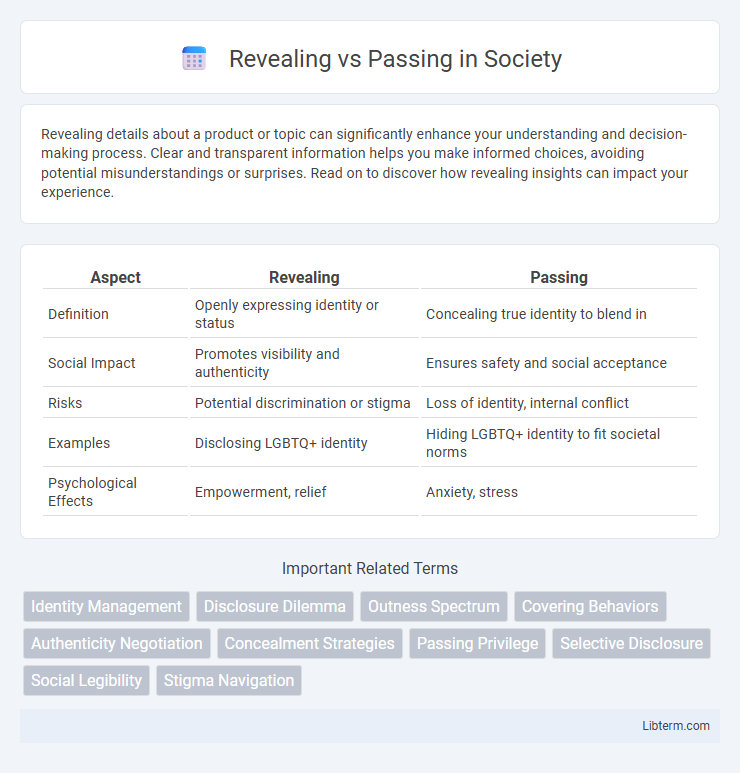Revealing details about a product or topic can significantly enhance your understanding and decision-making process. Clear and transparent information helps you make informed choices, avoiding potential misunderstandings or surprises. Read on to discover how revealing insights can impact your experience.
Table of Comparison
| Aspect | Revealing | Passing |
|---|---|---|
| Definition | Openly expressing identity or status | Concealing true identity to blend in |
| Social Impact | Promotes visibility and authenticity | Ensures safety and social acceptance |
| Risks | Potential discrimination or stigma | Loss of identity, internal conflict |
| Examples | Disclosing LGBTQ+ identity | Hiding LGBTQ+ identity to fit societal norms |
| Psychological Effects | Empowerment, relief | Anxiety, stress |
Understanding "Revealing" and "Passing": Definitions
Revealing" involves openly disclosing personal identity traits, such as sexual orientation or gender identity, to others, which can foster authenticity and acceptance. "Passing" refers to the ability of an individual to be perceived as a member of a different identity group, often to avoid discrimination or social stigma. Understanding these terms is essential for exploring experiences in LGBTQ+ communities, as they influence visibility, social dynamics, and personal safety.
Historical Context of Revealing and Passing
Revealing and passing have deep roots in social history, particularly within racially segregated societies where passing involved individuals presenting themselves as members of a different racial group to escape discrimination. Historical records show that revealing one's true racial identity often resulted in social ostracism or legal consequences, especially under Jim Crow laws in the United States. The dynamics of revealing versus passing highlight the tension between individual survival strategies and systemic racial oppression in the 19th and 20th centuries.
Psychological Effects of Concealing vs. Disclosing Identity
Concealing identity often leads to increased psychological stress, including anxiety, fear of exposure, and feelings of isolation. Disclosing identity can enhance self-esteem, foster authentic connections, and reduce cognitive load associated with hiding personal information. Studies indicate that individuals who reveal aspects of their identity tend to experience improved mental health outcomes compared to those who consistently pass or mask their true selves.
Societal Pressures Influencing Passing
Societal pressures to conform deeply influence the decision to pass, often driven by fear of discrimination or exclusion based on race, gender, or sexuality. Passing can serve as a survival mechanism in environments where revealing one's true identity may lead to social, economic, or legal consequences. These pressures highlight systemic inequalities that force individuals into complex negotiations of identity to navigate societal acceptance.
The Role of Privilege in Passing
The role of privilege in passing is critical, as it often hinges on social, racial, or economic advantages that allow individuals to navigate different identity boundaries without detection. Privilege can afford access to exclusive spaces and reduce the risks associated with passing, highlighting systemic inequalities in social mobility and identity recognition. This dynamic underscores how passing is not merely a personal choice but deeply entwined with societal power structures and biases.
Risks and Rewards: Choosing to Reveal
Choosing to reveal sensitive information carries the risk of vulnerability, including potential misuse or loss of control over that data. However, revealing can foster trust, transparency, and stronger relationships by demonstrating honesty and openness. The reward lies in increased collaboration and opportunities that often arise when stakeholders feel confident and informed.
Cultural Representations of Revealing and Passing
Cultural representations of revealing often emphasize authenticity, unveiling hidden truths, and challenging social norms, as seen in literature and film where characters disclose their true identities or emotions. In contrast, passing involves concealing one's identity to navigate oppressive social structures, frequently depicted in narratives exploring race, gender, and class dynamics. These themes highlight the tension between visibility and invisibility in personal and collective identity formation across diverse cultural contexts.
Navigating Relationships: Trust, Safety, and Authenticity
Navigating relationships requires balancing revealing personal truths with passing over sensitive information to maintain trust, safety, and authenticity. Establishing clear boundaries helps foster genuine connections while protecting emotional well-being. Authenticity thrives when individuals selectively disclose to build trust without compromising personal safety.
Impact on Mental Health: Shame, Pride, and Belonging
Revealing personal experiences often fosters a sense of pride and belonging, which can significantly improve mental health by reducing feelings of shame and isolation. In contrast, passing--concealing aspects of one's identity--may temporarily shield individuals from discrimination but often leads to increased internalized shame and anxiety. Embracing authenticity cultivates community support and self-acceptance, critical factors for positive psychological well-being.
Moving Toward Acceptance: Breaking the Stigma
Revealing personal struggles fosters authenticity and encourages supportive conversations that challenge existing stigmas around mental health and identity. Passing, or concealing aspects of oneself, may provide temporary relief but often perpetuates internalized shame and societal misconceptions. Embracing openness through revealing promotes collective acceptance and helps dismantle barriers that hinder emotional well-being and social inclusion.
Revealing Infographic

 libterm.com
libterm.com